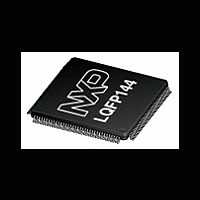LPC2926_27_29 NXP Semiconductors, LPC2926_27_29 Datasheet - Page 44

LPC2926_27_29
Manufacturer Part Number
LPC2926_27_29
Description
The LPC2926/2927/2929 combine an ARM968E-S CPU core with two integrated TCMblocks operating at frequencies of up to 125 MHz, Full-speed USB 2
Manufacturer
NXP Semiconductors
Datasheet
1.LPC2926_27_29.pdf
(95 pages)
- Current page: 44 of 95
- Download datasheet (2Mb)
NXP Semiconductors
LPC2926_27_29
Product data sheet
6.15.5.1 Functional description
6.15.5 Pulse Width Modulator (PWM)
The MSCSS in the LPC2926/2927/2929 includes four PWM modules with the following
features.
The ability to provide flexible waveforms allows PWM blocks to be used in multiple
applications; e.g. dimmer/lamp control and fan control. Pulse-width modulation is the
preferred method for regulating power since no additional heat is generated, and it is
energy-efficient when compared with linear-regulating voltage control networks.
The PWM delivers the waveforms/pulses of the desired duty cycles and cycle periods. A
very basic application of these pulses can be in controlling the amount of power
transferred to a load. Since the duty cycle of the pulses can be controlled, the desired
amount of power can be transferred for a controlled duration. Two examples of such
applications are:
•
•
•
•
•
•
•
•
•
•
•
•
Six pulse-width modulated output signals
Double edge features (rising and falling edges programmed individually)
Optional interrupt generation on match (each edge)
Different operation modes: continuous or run-once
16-bit PWM counter and 16-bit prescale counter allow a large range of PWM periods
A protective mode (TRAP) holding the output in a software-controllable state and with
optional interrupt generation on a trap event
Three capture registers and capture trigger pins with optional interrupt generation on
a capture event
Interrupt generation on match event, capture event, PWM counter overflow or trap
event
A burst mode mixing the external carrier signal with internally generated PWM
Programmable sync-delay output to trigger other PWM modules (master/slave
behavior)
Dimmer controller: The flexibility of providing waves of a desired duty cycle and cycle
period allows the PWM to control the amount of power to be transferred to the load.
The PWM functions as a dimmer controller in this application.
Motor controller: The PWM provides multi-phase outputs, and these outputs can be
controlled to have a certain pattern sequence. In this way the force/torque of the
motor can be adjusted as desired. This makes the PWM function as a motor drive.
All information provided in this document is subject to legal disclaimers.
Rev. 5 — 28 September 2010
ARM9 microcontroller with CAN, LIN, and USB
LPC2926/2927/2929
© NXP B.V. 2010. All rights reserved.
44 of 95
Related parts for LPC2926_27_29
Image
Part Number
Description
Manufacturer
Datasheet
Request
R
Part Number:
Description:
Lpc2926/2927/2929 Arm9 Microcontroller With Can, Lin, And Usb
Manufacturer:
NXP Semiconductors
Datasheet:
Part Number:
Description:
NXP Semiconductors designed the LPC2420/2460 microcontroller around a 16-bit/32-bitARM7TDMI-S CPU core with real-time debug interfaces that include both JTAG andembedded trace
Manufacturer:
NXP Semiconductors
Datasheet:

Part Number:
Description:
NXP Semiconductors designed the LPC2458 microcontroller around a 16-bit/32-bitARM7TDMI-S CPU core with real-time debug interfaces that include both JTAG andembedded trace
Manufacturer:
NXP Semiconductors
Datasheet:
Part Number:
Description:
NXP Semiconductors designed the LPC2468 microcontroller around a 16-bit/32-bitARM7TDMI-S CPU core with real-time debug interfaces that include both JTAG andembedded trace
Manufacturer:
NXP Semiconductors
Datasheet:
Part Number:
Description:
NXP Semiconductors designed the LPC2470 microcontroller, powered by theARM7TDMI-S core, to be a highly integrated microcontroller for a wide range ofapplications that require advanced communications and high quality graphic displays
Manufacturer:
NXP Semiconductors
Datasheet:
Part Number:
Description:
NXP Semiconductors designed the LPC2478 microcontroller, powered by theARM7TDMI-S core, to be a highly integrated microcontroller for a wide range ofapplications that require advanced communications and high quality graphic displays
Manufacturer:
NXP Semiconductors
Datasheet:
Part Number:
Description:
The Philips Semiconductors XA (eXtended Architecture) family of 16-bit single-chip microcontrollers is powerful enough to easily handle the requirements of high performance embedded applications, yet inexpensive enough to compete in the market for hi
Manufacturer:
NXP Semiconductors
Datasheet:

Part Number:
Description:
The Philips Semiconductors XA (eXtended Architecture) family of 16-bit single-chip microcontrollers is powerful enough to easily handle the requirements of high performance embedded applications, yet inexpensive enough to compete in the market for hi
Manufacturer:
NXP Semiconductors
Datasheet:
Part Number:
Description:
The XA-S3 device is a member of Philips Semiconductors? XA(eXtended Architecture) family of high performance 16-bitsingle-chip microcontrollers
Manufacturer:
NXP Semiconductors
Datasheet:

Part Number:
Description:
The NXP BlueStreak LH75401/LH75411 family consists of two low-cost 16/32-bit System-on-Chip (SoC) devices
Manufacturer:
NXP Semiconductors
Datasheet:

Part Number:
Description:
The NXP LPC3130/3131 combine an 180 MHz ARM926EJ-S CPU core, high-speed USB2
Manufacturer:
NXP Semiconductors
Datasheet:

Part Number:
Description:
The NXP LPC3141 combine a 270 MHz ARM926EJ-S CPU core, High-speed USB 2
Manufacturer:
NXP Semiconductors

Part Number:
Description:
The NXP LPC3143 combine a 270 MHz ARM926EJ-S CPU core, High-speed USB 2
Manufacturer:
NXP Semiconductors

Part Number:
Description:
The NXP LPC3152 combines an 180 MHz ARM926EJ-S CPU core, High-speed USB 2
Manufacturer:
NXP Semiconductors

Part Number:
Description:
The NXP LPC3154 combines an 180 MHz ARM926EJ-S CPU core, High-speed USB 2
Manufacturer:
NXP Semiconductors










